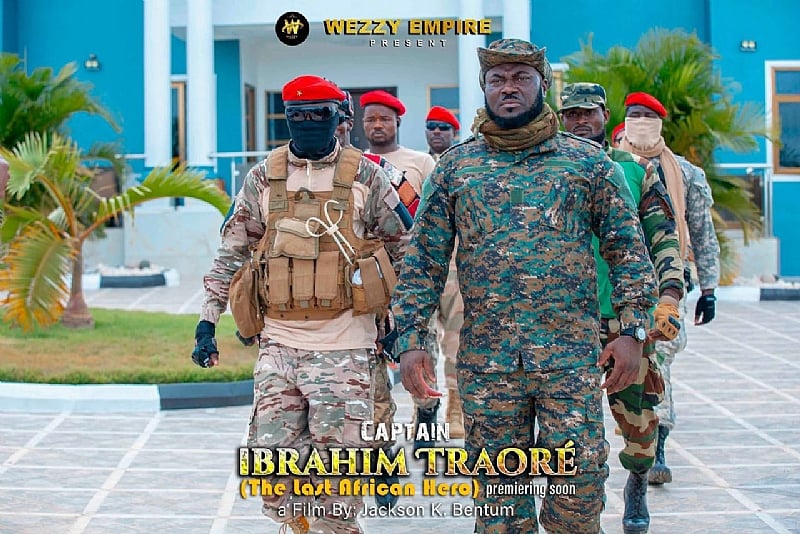Kwadwo Nkansah Lil Win, a prominent Ghanaian comic actor, has ventured into a new cinematic territory with his film “Ibrahim Traoré: The Last African Hero,” a project that has ignited a heated debate about the actor’s creative choices and the film’s potential implications. Lil Win’s production company, Weezy Empire Films, has defended the film against accusations of glorifying military rule and gun culture, emphasizing the actor’s right to explore diverse narratives and the importance of understanding history, regardless of its controversial nature. The controversy centers on the film’s subject matter: the leadership of Ibrahim Traoré, the military junta leader of Burkina Faso.
The criticism, spearheaded by entertainment critic Nana Ziega, alleges that Lil Win’s portrayal of Traoré romanticizes military coups and violence, sending a detrimental message to audiences. Ziega further argues that Lil Win, known primarily for his comedic roles, should confine his storytelling to Ghanaian narratives. Weezy Empire Films refutes these claims, asserting that the film’s objective is not to promote violence or military intervention but to present a historical account of Traoré’s leadership. They counter Ziega’s criticism of the film’s subject matter by stating that limiting storytelling to national borders demonstrates a narrow-minded perspective, neglecting the interconnectedness of global events and the value of exploring diverse narratives.
The production company challenges the notion that a comedian cannot effectively convey serious stories. They argue that Lil Win’s comedic background should not disqualify him from exploring complex and sensitive themes, highlighting the potential of comedy as a medium to reach wider audiences and facilitate understanding of intricate issues. They maintain that the film’s aim is to present a historical narrative, not to endorse or condemn the actions of its subject. This distinction, they argue, is crucial for understanding the film’s purpose and avoiding misinterpretations of its message.
Weezy Empire Films further elaborates on the film’s intention to depict the complexities of Traoré’s leadership, presenting him not merely as a villain but as a complex figure operating within a specific historical context. This approach, they believe, allows for a more nuanced understanding of the events in Burkina Faso and encourages viewers to engage with the story on a deeper level. They emphasize the importance of portraying historical figures with their inherent complexities, avoiding simplistic portrayals that reduce individuals to one-dimensional caricatures.
The controversy surrounding “Ibrahim Traoré: The Last African Hero” raises several key questions about artistic freedom, the role of comedians in addressing serious issues, and the potential impact of film on societal perceptions. Critics like Ziega argue that the film’s subject matter, coupled with Lil Win’s comedic persona, risks trivializing the serious issue of military coups and may inadvertently influence audiences to view such actions favorably. They express concern about the potential for the film to be misconstrued as an endorsement of military interventions, particularly given Lil Win’s popularity and influence.
On the other hand, Weezy Empire Films and supporters of Lil Win’s project maintain that artistic freedom allows for the exploration of diverse themes and perspectives, even those that are controversial or uncomfortable. They contend that restricting artists from tackling sensitive subjects based on their established image or genre limits creative expression and hinders meaningful dialogue. They argue that film can serve as a powerful tool for education and critical thinking, prompting audiences to grapple with complex issues and form their own informed opinions. The debate ultimately highlights the tension between artistic license and social responsibility, the potential for art to inspire or mislead, and the ongoing conversation about the role of entertainment in shaping public discourse.


